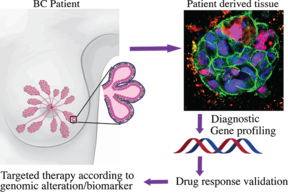Novel 3D matrix will allow predictive and effective breast cancer treatment

On average, more than 90% of the breast cancer drugs fail in clinical trials with real patients and each failed drug costs 1.4 billion euro. Tekes has now provided a funding of 0.5 million euros for Aalto University and the University of Helsinki to develop and commercialize a novel preclinical model to enhance drug development processes and personalized medicine approaches.
“By combining cutting edge nanotechnology and advanced cancer biology, we have successfully developed extracellular matrix, a material that mimics the cellular environment of the cancer tissues, keeping the structure of the tumour tissues unchanged and alive for a couple of weeks’ time and thereby allowing correct and personalized drug identification for cancer treatment”, explains Research Fellow Nonappa from Aalto University.
“The 3D matrix not only maintains tissue identity, but also heterogeneity of the tumour, which is a key feature of a preclinical model to predict correctly the real drug responses and thus accelerate the process of getting more effective treatments for the breast cancer patients”, adds postdoctoral researcher Pauliina Munne from the University of Helsinki.
Need for individualized treatments
In Finland, there are 5000 new breast cancer patients yearly, and globally one in every eight women undergo breast cancer diagnosis at one point in her lifetime. Despite significant increase in the five-year survival rates after detection, breast cancer remains one of the leading causes of death in women.
“We have failed to treat breast cancer with the current “one size fits all” treatment approaches. The present preclinical models including cell lines and animal tests are faulty, too simplistic and poorly predictive. This is due to their insufficient ability to mimic the original tumour cellular identity and heterogeneity”, describes Nonappa.
“The tumour consists of diverse cell types. If you try to grow a tumour sample on a Petri dish in a laboratory, only certain cell types will survive. The rest will either die or transform to another cell type. Drug response studies are usually performed using immortal cell lines, which represent only one or few cell types. These models are poorly predicting the drug responses in patient, which is evident from the high number of failed drugs in clinical trials”, adds Munne.
The successful commercialization team consists of inter-disciplinary team including internationally acclaimed material science group from Aalto University and breast cancer experts from the University of Helsinki together with an established network between Hospital district of Helsinki and Uusimaa, securing the availability of tumour samples.
Further information:
Nonappa
Research Fellow
Aalto University
tel. +358 50 593 1480
nonappa@aalto.fi
Pauliina Munne
Postdoctoral researcher
University of Helsinki
tel. +358 29 412 5494
pauliina.munne@helsinki.fi
Read more news

Apply Now: Unite! Visiting Professorships at TU Graz
TU Graz, Austria, invites experienced postdoctoral researchers to apply for two fully funded visiting professorships. The deadline for expressions of interest is 20 February 2026, and the positions will begin on 1 October 2026.
Hanaholmen’s 50th anniversary exhibition lives on online – making the history of Finnish–Swedish cooperation accessible worldwide
MeMo Institute at Aalto University has produced a virtual 3D version of the anniversary exhibition of Hanaholmen.Soil Laboratory Exhibition – Exploring the Dialogue Between Human and the Earth in Utsjoki
Soil Laboratory explores the relationship between humans and the earth as a living landscape through ceramic practices in Utsjoki.






